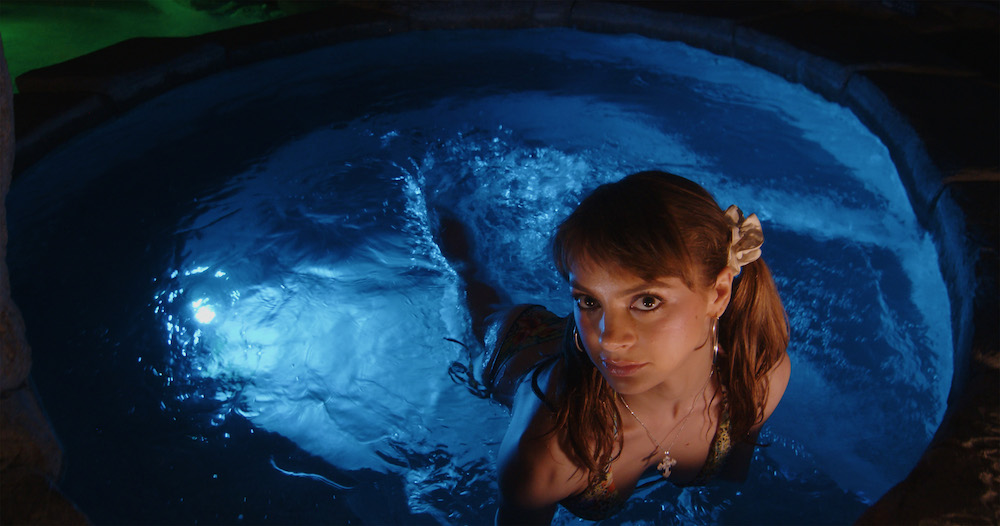The tedium of a particular self-consciousness ascribed to Generation Z was on full display in The Death of a Star, a performance and self-proclaimed “reality show,” directed by Jasmine Johnson, which had a sold-out four-day run at New Theater Hollywood (NTH) this June. The black-box theater, run by the artists Max Pitegoff and Calla Henkel, which has quickly made a name for itself as one of the city’s most interesting venues for performance, presented Johnson’s show in four parts. After an introduction by a sort of “Greek chorus” figure, five of the show’s six cast members (sans Peggy Noonan, who apparently fell out with the rest of the cast and moved to New York City during the show’s run) appeared from behind the screen when their names were called and remained onstage throughout the screening, with occasional interjections. The artistic premise—that the cast becomes both viewer and viewed with its attendant implications around the uncanny nature of reality television—wore thin at this point.
The film they are watching, the show within the show, follows five girls and one gay guy, under the presumption that they are trying to make it in Hollywood, though their ambitions for fame are vague and halfhearted. An inherent, overarching ambivalence toward the things the characters want or say they want informs these performances. Fame is not really the thing they are after—these kids know that this kind of fame no longer exists. However, overeducated in this kind of reality TV script, they know how to perform like people who are trying to achieve fame. What they really want is ambiguous; it is hard to tell if they want anything at all.

Poster for The Death of a Star.
The film begins with a kind of roll call in the very theater we are all in. It seems late; everyone is visibly drunk on cheap wine, giving the camera a glassy-eyed stare. Each character says an ad-libbed platitude; their bodies are all somewhat droopy, slumped over in the red-velvet theater seats. Victoria Davidoff, a young woman with a blasé gape and a missing finger, says with a sigh, “I don’t know what I want from LA, I just don’t know where else to go.” The character Deevious begins each address to the camera with “Hey guys,” as though she is addressing her TikTok fans. There is an energized aimlessness as the cast wanders around the theater, as if they are trapped by the same force as in Luis Buñuel’s The Exterminating Angel. In this way, at least, the film manages to capture some of the strange ennui of life within reality TV that is not written, yet somehow feels rehearsed and constructed.
Perhaps it is appropriate that the best part of the work is its short introduction, which functions as a sort of trailer—a 60-second montage of the cast walking around Hollywood in trashy early-2000s garb, smoking cigarettes, vaping, going in and out of liquor stores, breaking into a park at night, hanging out in the bathroom at parties, all washed in an eeriness reminiscent of David Lynch’s 2006 experimental psychological thriller Inland Empire. A disembodied Kim Gordon recites the film’s only scripted lines. One goes, “In the battle of existence, talent is the punch; tact is the clever footwork.” Everything in that short clip, as in the rest of the film, is well-photographed and sounds good—Noonan in her room talking about a bullet that went through her window, Davidoff explaining how her finger got cut off. Moments like these effectively suggest something authentic is being captured, but they quickly crumble into pastiche. What the director or the actors are trying to say is muddled by layers of irony. This is insisted upon in the refrain that there “is no format,” or that the film is about just that: looking for the format. But it seems to me that this formlessness and reliance on irony allow the director to evade the task of having to follow through with a full idea. A form might have emerged if the camera was more decisive and less ambient, and it would have been welcomed.
The film is burdened by a self-awareness that prevents it from fully indulging in its wildness. The actors are too well-versed in reality TV and too aware of themselves on camera, such that the cumulative work becomes strained with affectation—that is not to say they might not make interesting subjects. After the show, as the theater emptied out, there was loud snorting coming from the dressing room. I did want to know what these people were doing and what it would look like if the cameras captured the NTH’s backstage—getting behind the behind-the-scenes.


